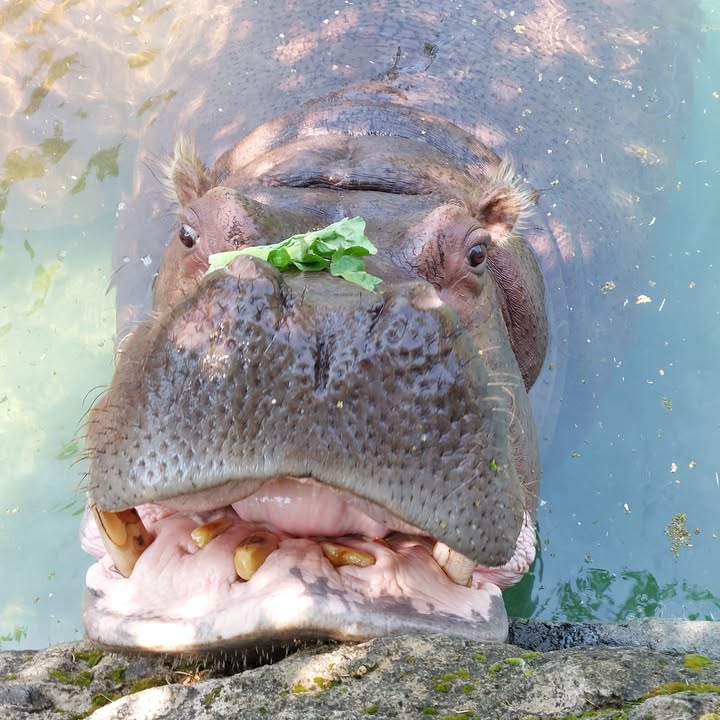- The Importance of Dental Health in Zoo Animals
- Petal’s Dental Procedure and Recovery Process
- The Role of Veterinary Specialists in Zoo Animal Care
- The Significance of Monitoring and Post-Procedure Care
- Insights into Hippopotamus Conservation and Care
Dental health plays a crucial role in the overall well-being of zoo animals, ensuring they lead comfortable lives free of pain. In captivity, dental issues can arise from a variety of factors, including diet and aging. Such problems are of great concern to zoo veterinarians and animal caretakers, necessitating proactive measures and regular check-ups.
Petal, a 39-year-old river hippopotamus residing at Toronto Zoo, recently underwent a successful dental procedure. Veterinary challenges are part of life in a zoo, where ensuring the health of diverse species requires prompt and precise action. Petal’s case involved the extraction of an infected canine tooth. This tusk, significant in size and naturally curved, posed a considerable challenge. Extracting such a tooth safely required removing a small section of bone from her jaw. This step, although invasive, was essential to address the infection and prevent further complications.
During the procedure, Petal was under anesthesia, which provided an opportunity for a comprehensive health assessment. Fortunately, aside from the dental issue, she was in good health. Monitoring anesthesia in large animals like hippopotamuses is a complex task, involving careful attention to their respiratory and cardiovascular functions. Special equipment and expertise are required to maintain safety throughout the procedure.
Veterinary specialists play an indispensable role in zoo animal care. This includes external dental experts who bring their specialized knowledge to support the zoo’s veterinary team. Such collaborations are vital, combining resources and expertise to manage complex medical cases effectively. In Petal’s case, the partnership ensured precise execution of her dental treatment, highlighting the necessity of interdisciplinary efforts in veterinary medicine.
Post-procedure care is essential for recovery. Petal is currently receiving pain medication, a crucial component in managing her post-operative comfort. Pain relief not only aids her physical healing but also ensures she can continue normal activities such as eating and socializing, which are critical for her psychological well-being. The zoo team remains vigilant, closely monitoring her recovery progress.
Observing animals for signs of normalcy after medical interventions is vital. Petal’s return to eating and playful interactions with her sister, Perky, are positive indicators of her resilience. Minor skin abnormalities observed around her jaw are being watched carefully, underscoring the complexity of healing after such procedures. Regular health checks and management of any emerging issues are part of the ongoing commitment to her care.
Beyond individual care, hippopotamuses face conservation challenges in the wild. Habitat loss and conflicts with humans threaten their populations. Zoos play a critical role in raising awareness about these issues and contribute to global conservation efforts. By housing species like Petal, zoos offer educational opportunities and promote understanding of the species’ behavior and needs, fostering a connection between visitors and wildlife.
Petal’s journey through her dental issue reflects comprehensive animal management and veterinary excellence. As we follow her recovery, it serves as a reminder of the dedication required to care for zoo residents. The collaborative efforts in animal health care ensure animals like Petal can enjoy a high quality of life, even in captivity.
Through ongoing care and attention, the Toronto Zoo continues to uphold its commitment to animal welfare, providing a safe and nurturing environment for its inhabitants. Petal’s story is not just about veterinary success; it’s a story of teamwork, dedication, and a testament to the intricate care involved in managing zoo animals.
*****
Source Description
We are happy to share that Petal, the 39-year-old river hippopotamus, is doing well after her dental procedure and examination yesterday 🦛🦷
Your Toronto Zoo team, and two external veterinary dental specialists, successfully extracted an infected canine tooth (tusk) from the lower right side of her mouth.
Due to the large size and naturally curved shape of the tooth, a small section of bone was removed from her jaw in order to facilitate complete extraction. While under anaesthesia, Petal also had a complete health assessment that revealed she is generally in good health (aside from the tooth of concern).
She is currently receiving pain medication as she heals, and we’re pleased to report she’s eating and returning to her normal self. Our team will continue to closely monitor her post-anesthesia recovery.
Weather permitting, Petal and her sister Perky may be visible in their habitat in the African Savanna in the coming days.
Please note: although most of the dental work was performed inside her mouth, you may notice a patch of abnormal skin on the outside of her jaw. Rest assured, our team is monitoring this closely as part of her ongoing recovery🦛


